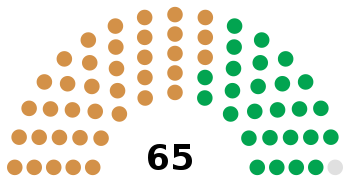February 2012 Kuwaiti general election
Early general elections were held in Kuwait on 2 February 2012,[1] the country's second general election in a three-year period. The election's turnout rate was 59%.[1] However, in June 2012 Kuwait's Constitutional Court declared the elections invalid and reinstated the former parliament. The court said the dissolution of Parliament in December 2011 by Emir Sabah Al-Sabah was unconstitutional.[2] In response, opposition MPs resigned from parliament and demanded a full parliamentary system.[3]
| ||||||||||||||||
All 65 Members voting in the National Assembly of Kuwait 33 votes needed to win | ||||||||||||||||
|---|---|---|---|---|---|---|---|---|---|---|---|---|---|---|---|---|
| ||||||||||||||||
 | ||||||||||||||||
| ||||||||||||||||
 |
|---|
| This article is part of a series on the politics and government of Kuwait |
|
|
|
Constitution |
|
|
Ruling family
|
|
|
|
Related topics
|
|
|
After the dissolution of parliament, a new election was set for December 2012.
Background
Emir Sabah Al-Sabah dissolved the National Assembly of Kuwait on 7 December 2011 citing "deteriorating conditions" amid an increasingly bitter political showdown over alleged high-level corruption. Major street demonstrations, some with crowds numbering in the tens of thousands, had been occurring with greater and greater frequency, forcing the resignation of the government for the second time in less than a year.[4] A group of former government parliamentarians sued to reverse the dissolution, stating that the act was unconstitutional.[5] In response the decree to set the date for the new election was delayed. The election was eventually set for 21 February.[6]
Campaign
While operating within the Constitution of Kuwait, opposition candidates are demanding significant reforms, including a constitutional monarchy. Shiite candidate and ex-MP Hussein al-Qallaf accused the opposition of wanting to share power with the ruling family, which he said would lead Kuwait into a state of chaos.[7]
Candidates
There were 344 candidates, including 24 women, who ran in five constituencies with ten seats each.[8]
Opinion polls
According to some polls, the opposition may gain as many as 33 seats, up from the 20 seats they held before.[9]
Results
Liberal bloc won 9 seats.[10] The opposition bloc won 34 out of 50 seats in the parliament.[10] The opposition bloc is a loose coalition of liberals, Islamists, secular nationalists, populists, tribes and a few Shiites. Sunni Islamists and tribes combined won 23 seats.[10]
| formal or informal group | Seats |
|---|---|
| Independent | 19 |
| Liberal | 9[11] |
| Sunni Islamist | 13[12] |
| Popular Action Bloc & opposition reformists | 11[12] |
| Total (turnout: 59%)[13] | 50 |
The biggest margin of victory in each constituency was led by:[14][15][16][17]
- Faisal al-Duwaisan with 14,094 votes.
- Jamaan al-Harbash (or Jama'an al-Hirbish) with 8,475 votes.
- Faisal al-Mislem al-Otaibi with 16,383 votes.
- Musallam al-Barrak.
- Falah al-Sawwagh.
References
- Sharaf, Nihal; Abubakar A. Ibrahim (2 February 2012). "New faces for opposition reset: Endemic disputes dull voter optimism". Archived from the original on 4 February 2012. Retrieved 4 February 2012.. One hour before polls closed, 238308/400296=59.53 percent, rounds to 60 percent.
- Kuwait court voids election and reinstates parliament BBC News, 20 June 2012
- "Kuwaiti opposition demand "full parliamentary system"". Reuters. 22 June 2012.
- "Kuwait emir dissolves parliament citing 'deteriorating conditions'". The National. Associated Press. 25 May 2010. Retrieved 7 February 2012.
- "Former MPs to challenge dissolution of Assembly". Kuwait Times. 13 December 2011. Retrieved 7 February 2012.
- "Amiri decree setting date for elections delayed". Arab Times. UK. Retrieved 7 February 2012.
- "Kuwait votes in polls hoping to end deadlock". English.alarabiya.net. 22 January 2012. Retrieved 7 February 2012.
- "7 % women candidates for Kuwaiti parliament elections". WoMen Dialogue. 2 February 2012. Archived from the original on 24 March 2013. Retrieved 7 February 2012.
- "Kuwait Election May Deepen Deadlock, Bolster Opposition". Bloomberg Business. 1 February 2012. Retrieved 7 February 2012.
- "Kuwait election: Islamist-led opposition makes gains". BBC News. 3 February 2012.
Liberals won nine seats, while women did not win any.
- "Kuwait election: Islamist-led opposition makes gains". BBC News. 3 February 2012.
Liberals won nine seats, while women did not win any.
- The 4 Feb Kuwait Times article gives 34 - (4+4) = 26 seats to Sunni Islamists and the Popular Action Bloc together. These are entered as 13 for each pending more information. An update is likely to be published at this IPU page (see the archive).
- Sharaf, Nihal; Abubakar A. Ibrahim (2 February 2012). "New faces for opposition reset: Endemic disputes dull voter optimism". Archived from the original on 3 February 2012. Retrieved 4 February 2012.. One hour before polls closed, 238308/400296=59.53 percent, rounds to 60 percent.
- "Justice Al-Khudhair announces 1st constituency winners". Kuwait News Agency. 3 February 2012. Archived from the original on 4 February 2012. Retrieved 4 February 2012.
- "Justice Al-Mutairat announces winners of parliamentary elections of 2ndconstituency". Kuwait News Agency. 3 February 2012. Archived from the original on 4 February 2012. Retrieved 4 February 2012.
- "List of Winners". Kuwait Times. 3 February 2012. Archived from the original on 4 February 2012. Retrieved 4 February 2012.
- "Ten candidates to represent 3rd constituency in National Assembly". Kuwait News Agency. 3 February 2012. Archived from the original on 4 February 2012. Retrieved 4 February 2012.